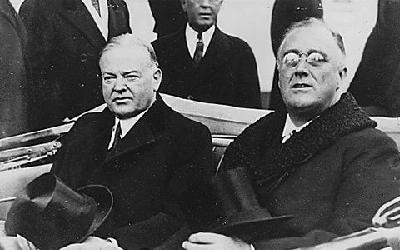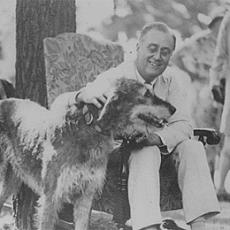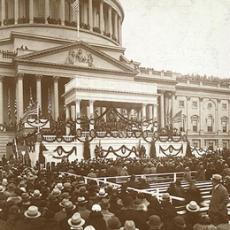
STEVE EMBER: Welcome to THE MAKING OF A NATION – American history in VOA Special English. I'm Steve Ember with Shirley Griffith. This week in our series, we begin the story of President Franklin Delano Roosevelt.
(MUSIC)
In 1932 Americans were tired of the policies of Republican President Herbert Hoover. They thought Hoover had done too little to fight the depression that was crushing the economy.
They gave a big victory to Franklin Roosevelt and his Democrats in the elections that year. Roosevelt believed that the federal government should do more to help average Americans.
The election brought hope to many Americans in the autumn of 1932. But Roosevelt did not become president until March of 1933, four months after the election. And those months saw the American economy fall to its lowest level in the history of the nation.
SHIRLEY GRIFFITH: President Hoover tried to arrange a world economic conference. And he called on President-elect Roosevelt to join him in making conservative statements in support of business.
Roosevelt refused. He did not think it was correct to begin acting like a president until he actually became the president. He did not want to tie himself to policies that the voters had just rejected.
Congress, controlled by Democrats, also refused to help Hoover.
STEVE EMBER: It was a strange period, a season of uncertainty and anger. The economy was worse than ever. The lines of people waiting for food were longer than before. Angry mobs of farmers were gathering in the countryside. And the politicians in Washington seemed unable to work together to end the crisis.
Hoover said, We are at the end of our rope. There is nothing more we can do. And across the country, Americans waited -- worried, uncertain, afraid. What would the new president do?
SHIRLEY GRIFFITH: The new president was 51 years old. His family name was well-known to the American public. Theodore Roosevelt -- a distant family member -- had served as one of America's greatest presidents 30 years earlier.
Franklin Roosevelt was born to a rich and important New York family. He went to the best schools: Groton, Harvard and Columbia Law School. In 1910, he won election to the New York State Legislature. He showed great intelligence and political understanding as a state senator, and worked hard for other Democratic candidates.
Franklin Roosevelt next served as assistant secretary of the Navy under President Woodrow Wilson. And in 1920, he was the Democratic Party's unsuccessful candidate for vice president.
STEVE EMBER: The next year, Roosevelt suffered a personal tragedy. He was sailing during a holiday with his family. Suddenly, his body became cold. He felt severe pain in his back and legs. Doctors came. But the pain got worse. For weeks, Roosevelt was forced to lie on his back.
Finally, doctors discovered that Roosevelt was a victim of polio. He lost control of his legs because of the disease. He would never walk again.
Roosevelt had always been an active man who loved sports. But now he would have to live with a wheelchair. All of his money and fame could not get him back the strength in his legs.

SHIRLEY GRIFFITH: Many Americans thought the illness would end Roosevelt's political dreams. But they were wrong. He showed an inner strength that people had never seen in him before.
Roosevelt ran as the Democratic candidate for governor of New York state in 1928. He won by a small number of votes.
Two years later, the voters of New York re-elected Roosevelt. And they cheered his creative efforts to help citizens of the state who were suffering from the Great Depression.
(MUSIC)
STEVE EMBER: Franklin Roosevelt always appeared strong and friendly in public. He loved to laugh and enjoy life. But his happy face hid a strong will.
Throughout his life, Roosevelt worked to improve life for the common man. And he was willing to use the power of government to do this. He thought the government had the power and responsibility to improve the life of its citizens.
SHIRLEY GRIFFITH: Roosevelt believed deeply in this. But he was less certain about the best way to do it. "Above all, we must try something," he said during the presidential campaign of 1932. Roosevelt believed that the country demanded creative experimentation.
Americans in large numbers across the country voted for Roosevelt in 1932. They supported his calls for action to end the depression. But no one was really sure just what this new president from New York -- this man unable to walk -- would really do after he entered the White House.

STEVE EMBER: Inauguration Day in 1933 began with clouds and a dark sky. Roosevelt went to church in the morning. And then he drove with President Hoover from the White House to the Capitol, the building where Congress meets.
Roosevelt tried to talk with Hoover as they drove. But Hoover said little. He just waved without emotion at the crowd.
The two men arrived at the Capitol. A huge crowd of people waited. Millions more Americans listened to a radio broadcast of the ceremony. The chief justice of the United States, Charles Evans Hughes, gave the oath of office to Roosevelt.
And then Americans waited to hear what the nation's 32nd president would say.
He told them he was sure they expected him to speak openly and honestly about the situation facing the country. He told them that their great nation would survive as it had survived in the past, and that it would recover and become rich again.
He talked about the danger of fear -- a nameless fear that blocked efforts to move forward. And he talked about Americans giving their support to honest, active leadership in every dark hour of their history.
Here is some of Roosevelt's inaugural address in his own words.
PRESIDENT ROOSEVELT: "This great Nation will endure as it has endured, will revive and will prosper. So, first of all, let me assert my firm belief that the only thing we have to fear is fear itself--nameless, unreasoning, unjustified terror which paralyzes needed efforts to convert retreat into advance."
SHIRLEY GRIFFITH: Roosevelt's words caught the emotions of the crowd. He seemed sure of himself. He promised leadership. His whole style was different from the empty promises of wealth offered by President Hoover.
PRESIDENT ROOSEVELT: "Happiness lies not in the mere possession of money; it lies in the joy of achievement, in the thrill of creative effort. The joy and moral stimulation of work no longer must be forgotten in the mad chase of evanescent profits. These dark days my friends will be worth all they cost us if they teach us that our true destiny is not to be ministered unto but to minister to ourselves, to our fellow men."
SHIRLEY GRIFFITH: Roosevelt said that the most important need was to put people back to work. And he said the federal government would have to take an active part in creating jobs.
Roosevelt said there were many ways to help the nation recover. But he said it would never be helped just by talking about it. "We must act," he said, "and act quickly."
STEVE EMBER: Roosevelt had a strong and serious look on his face. He told the crowd that all the necessary action was possible under the American system of government. But he warned that Congress must cooperate with him to get the nation moving again.
Then, his speech finished, Roosevelt waved to the crowd and smiled. Herbert Hoover shook his hand and left. Roosevelt rode alone through the huge crowds back to the White House. And he immediately began a series of conferences.
SHIRLEY GRIFFITH: Roosevelt's inauguration speech of 1933 was one of the most powerful and important speeches in American history. Roosevelt's speech was like an ocean wave that washes away one period of history and brings in a new one. The president seemed strong. He gave people hope.
The new president promised the American people action. And action came quickly. During the next three months, Roosevelt and the Democrats would pass more major new programs than the nation had seen in many years.
We look at this beginning of the Roosevelt administration in our next program.
(MUSIC)
STEVE EMBER: Our program was written by David Jarmul. With Shirley Griffith, I'm Steve Ember. You can find our series online with pictures, transcripts, MP3s and podcasts at voaspecialenglish.com. You can also follow us on Facebook and Twitter at VOA Learning English. Join us again next week for THE MAKING OF A NATION -- an American history series in VOA Special English.
polio: an infectious disease that affects the central nervous system and can cause temporary or permanent paralysis 脊髓灰质炎;小儿麻痹症
evanescent: disappearing quickly from sight or memory 瞬息即逝的;迅速遗忘的
American history: how the Depression put a squeeze on foreign relations
American history: nation grows more conservative in '20s
American history series: the United States turns inward after World War One
American history: Roosevelt exercises US power around the world
(来源:VOA 编辑:崔旭燕)
